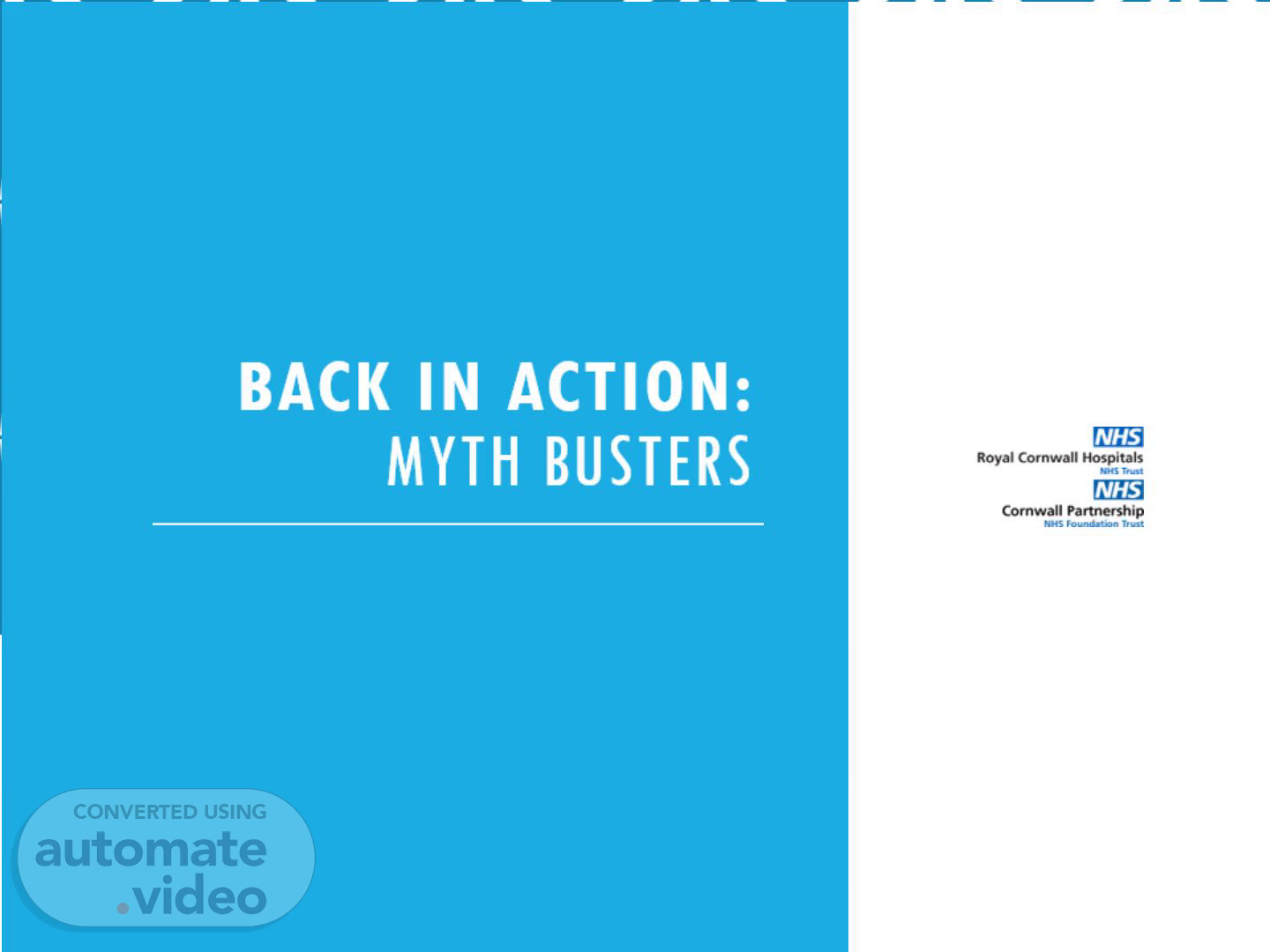Scene 1 (0s)
Back In Action: Myth Busters. [image].
Scene 2 (7s)
[Audio] Ask the group: Do you think pain equals damage?.
Scene 3 (14s)
[Audio] We can experience pain without any damage or injury. Pain is complex and there are many factors that contribute to us experiencing pain. We can have structural 'changes' but these are not solely the cause of our pain – sometimes these are not causing us any pain! Pain is a signal that our systems are feeling threatened and are fearful of being harmed. With back pain, often there is no actual threat or potential harm, yet we can still experience a lot of pain. We will discuss this more in the 'Modern Understanding of Pain' session. Physical factors e.g. being deconditioned, 'protecting' the back and avoiding activity can contribute to our pain. Psychological factors such as worry, fear of not getting better, low mood, stress can all contribute to our pain. General health e.g. feeling run down, lack of sleep, being overweight or not getting enough exercise can all contribute to our pain. Social factors e.g. difficult relationships, stressful events, work issues can all contribute to our pain. All pain is an output of the brain regardless on what factors are involved. All pain is very real. It is important that we are aware of what factors contribute to us experiencing pain and that it is not all to do with structure/physical aspects. It is important for people to recognise what factors are personally relevant to them e.g. social influence, their perception of their pain, their fears etc. We can help turn the dial down through graded exposure to movement and activity. We can help keep the dial turned down by regularly participating in varied physical activity. We can also help keep the dial down by addressing any negative influences/thoughts that may be impacting our pain..
Scene 4 (2m 7s)
[Audio] Example of what factors contribute to pain. Discuss how their contribution can vary between people and at different times. Ask the group: What are your thoughts about this? Be open to opposing ideas. This will be discussed further in 'Modern Understanding of Pain' session..
Scene 5 (2m 24s)
[Audio] Ask the group: Do you think exercise or movement will worsen your symptoms?.
Scene 6 (2m 31s)
[Audio] Even though movements can be sore, movement is still good. We may need to adjust how much we do certain movement at certain times to manage our pain. But ensuring regular variety of movement will benefit our backs. We will discuss this more in 'Pacing & Flare management' and 'Activity & Back Pain' sessions..
Scene 7 (3m 2s)
[Audio] Ask the group: Do you think we should exercise with back pain? Do you think we should lift weights with back pain?.
Scene 8 (3m 10s)
[Audio] This will be discussed more in the 'Activity & Back Pain' session. Regular physical activity is important in managing back pain successfully. There is not one exercise better than another but aiming to meet physical activity guidelines with activity you enjoy is a good place to start. Lifting weights is a good strengthening exercise and actually helps to keep our back muscles healthy. Starting at a level you can tolerate and building up gradually is recommended..
Scene 9 (3m 38s)
[Audio] Ask the group: Do you think a scan tells us exactly what is causing us pain?.
Scene 10 (3m 46s)
[Audio] This links into how pain is not solely caused by physical changes. Discuss MRI findings which are normal – use table. Often findings are wrongly blamed for pain. This can lead us to feeling like we need to protect our backs..
